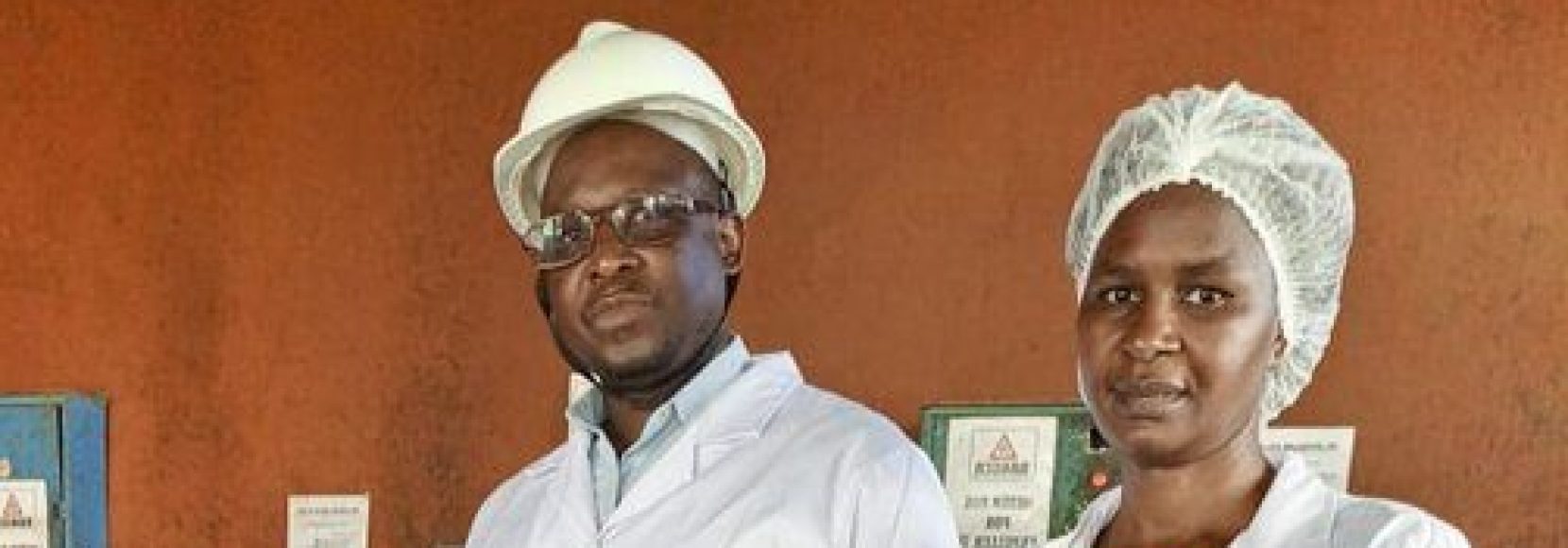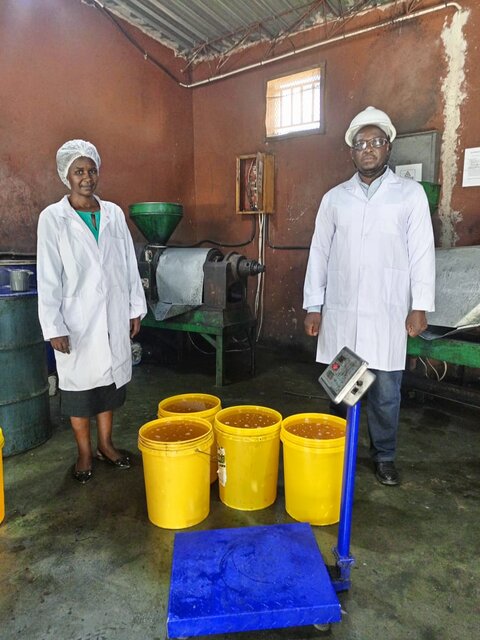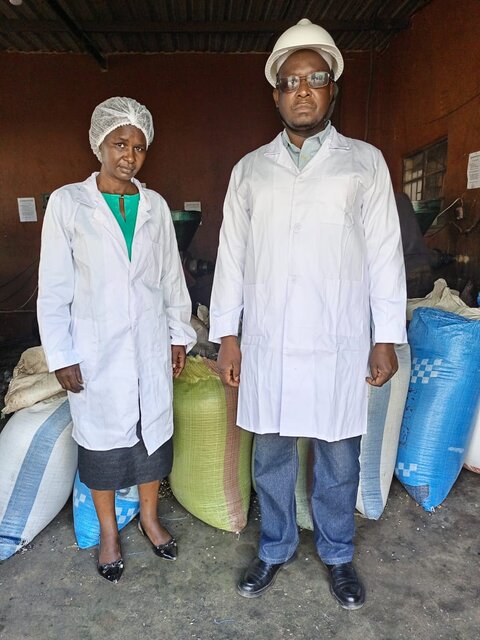
A Power Couple in Zambia Empowers Women Through Business
Discover the innovative approach to business taken by the husband and wife team behind a milling business in Zambia, and how their unique application of a gender lens to their company operations has contributed to their success.
When Zenny Mumba and Ackim Wamundila were first married nearly 30 years ago, they both worked at a milling company. But when it closed its operations, they both found themselves unemployed. Since milling was all they knew, they started their own venture.
In 1997, Zenny and Ackim registered Wachi Milling, a food processing company in the capital of Zambia. Food processing companies that mill flour, pasteurize dairy products, press cooking oils, and make other food products are vital to economic growth and nutrition. In Zambia, an estimated 1,500 food processors account for 60% of the country’s manufacturing output.
“We believed that if we worked together as a couple and kept working hard, we could feed ourselves and have the money for bills and other necessities.” Speaking today, Ackim proudly puts his arm around his wife Zenny when describing what motivated them to start their business.
Challenges to Women in Business Around the World

To achieve success in business women, like Zenny, women have to overcome many challenges. Empowering women to achieve their full potential is one of the most powerful ways to fight poverty. Yet in many countries where TechnoServe works, women continue to face tremendous barriers to economic success. They have limited access to the productive resources like land, finance, and information that they need to grow their businesses. In most cases, women must also balance the bulk of household and childcare responsibilities with efforts to improve their skills and earn independent incomes.
TechnoServe helps women around the world overcome these obstacles by working with families and communities to overcome gender barriers that may prevent women’s equal participation in training programs or income-generating activities. As part of this approach, we developed a system of jointly training husbands and wives, like Zenny and Ackim, in order to foster appreciation for women’s economic contributions, as well as greater dialogue, knowledge-sharing, and joint decision-making within the household.
The Gender Responsive Diagnostic (GRD) tool is yet another way to improve women’s economic power through a business-oriented approach. In sub-Saharan Africa, TechnoServe is helping agribusinesses identify gender-responsive business practices that can help them reach their commercial goals while also supporting women’s economic empowerment as suppliers, workers, and leaders. Using the GRD tool, companies work with advisors to prioritize a set of gender-responsive business practices to adopt and develop an action plan to track their progress towards specific goals.
The tool helps strengthen businesses and benefit women by adopting practices that support inclusive supply chain participation, equitable resource and service delivery, inclusive financial benefits, and safe and inclusive workplaces. By adopting practices in these areas, businesses can reach more women, improve their productivity and product quality, ensure that women can fully benefit from their labor, and ensure that the organization itself is set up to support women suppliers and workers.
The Impact of Applying A Gender Lens to Business
Zenny and Ackim identified several gender-related challenges by using the GRD tool. For one, their company sourced an unstable supply of raw materials from local farmers and did not track the number of men and women in its supply chain. At the plant, it leaned heavily towards employing men, and women faced practical obstacles to working there. Men and women were also forced to share a single space for restrooms and washing facilities.
Connecting with women is what’s best for our business.
Zenny Mumba
Once Zenny and Ackim were aware of the challenge, they continued to work with TechnoServe [through the Food Enterprises for a Developed Zambia (FED Zambia) program, a partnership with the Swedish International Development Cooperation Agency (Sida)] to solve them. Wachi Milling committed to developing and implementing a worker safety and harassment policy, to provide separate toilet and shower facilities for men and women staff, and keep sex-disaggregated supplier records.
“What I’ve learned from the GRD is that connecting with women is what’s best for our business. It will help us grow, it is best for our production, and it is also the best for our raw material acquisition,” says Zenny. “It will also help us empower women that are connected to us…I have learned that when we are connected to women, they help us grow our best operations, and we empower them in their own businesses.”
“There’s a high prevalence of unemployment among women. Even women that are running businesses are very, very few,” says Ackim. “TechnoServe taught us and highlighted that women have been marginalized and we need to have different policies and bring them on board.”
While Zambia’s national poverty rate remains high, the levels of inequality between rural and urban areas continue to rise affecting girls and women disproportionately. With the poverty rate in rural Zambia at 78%, women and adolescent girls are particularly vulnerable.
“We need updated policies. We need to first consider qualified women personnel and applicants,” says Ackim. “If the women applicants are as qualified as men, we can reduce inequality through employment. We’ve been taught that when you support a woman, women are better managers. They look at their families and they improve the livelihood of the entire family.”
Future Plans for the Power Couple

In the next year or two, Zenny and Ackim plan on building a refinery to help them refine their cooking oil and engage in soybean production. “This will mean that we shall employ more women in our organization because we will have more work to do and will need a large workforce,” says Zenny.
“In ten years’ time, we’re looking forward to establishing a grower scheme run by women who we can empower financially and teach the best practices of business as we are being taught by TechnoServe,” says Ackim. “We’re also going to teach them so that they become more established as suppliers.”
Zenny and Ackim believe that the greatest benefit to other companies is to apply a similar gender-inclusive approach. “I would urge other businesses to apply the gender lens because they will be empowering the nation and its economy shall grow,” says Zenny. “Empowering a woman is empowering the nation.”
Zenny and Ackim’s journey was fraught with gender-related challenges that highlighted the need for gender-responsive business practices to improve women’s economic power. By empowering women, businesses can reach more women, improve productivity and product quality, and ensure that women can fully benefit from their labor. TechnoServe seeks to overcome gender barriers that prevent women from achieving economic success, balancing the bulk of household and childcare responsibilities with efforts to earn independent incomes.
If you want to help women and girls overcome poverty and join the fight for gender equality, please join us.
RELATED ARTICLES:





